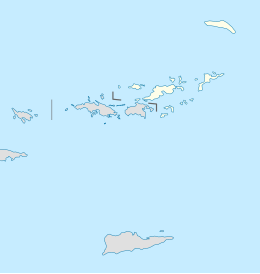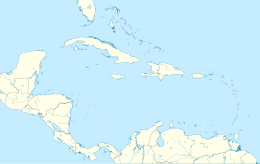Little Jost Van Dyke (colloquially, "Little Jost") is one of the British Virgin Islands. It is a small island on the east end of the island of Jost Van Dyke. Like Jost Van Dyke, it takes its name from the Dutch privateer Joost van Dyk. It is the location of the Diamond Cay National Park, which includes the nesting grounds of wild boobies, terns and pelicans.[1]
Nickname: Little Jost | |
|---|---|
 Little Jost Van Dyke at upper left | |
 The location of Little Jost Van Dyke within the British Virgin Islands | |
| Geography | |
| Location | Caribbean Sea |
| Coordinates | 18°27′13″N 64°43′15″W / 18.45361°N 64.72083°W |
| Archipelago | Virgin Islands |
| Administration | |
United Kingdom | |
| British Overseas Territory | British Virgin Islands |
| Demographics | |
| Population | 0 |
| Additional information | |
| Time zone | |
| ISO code | VG |
Sights
editDive sites can be found at Twin Towers, two large rock formations rising from 90 feet.
There is a small bar and restaurant called B-Line Beach Bar on the south side of the island.[2] The bar can be reached by docking at a crumbling cement pier that was constructed for a failed fuel depot project. The operators of the bar are the island's only inhabitants.
Fauna and flora
editEagle rays and tarpon are found here.[3]
Natives
editThe island has no major settlement today, but was the site of an eighteenth-century Quaker colony.
John C. Lettsome (1744—1815), founder of the Medical Society of London,[4] was born on the island.
References
edit- ^ Little Jost Van Dyke & Diamond Cay National Park, British Virgin Islands Archived 30 September 2007 at the Wayback Machine
- ^ "B-Line Beach Bar | Facebook". www.facebook.com. Retrieved 8 September 2016.
- ^ "Little Jost Van Dyke". The British Virgin Islands. Archived from the original on 15 July 2014. Retrieved 14 July 2014.
- ^ "Jost Van Dyke, BVI - Home to Soggy Dollar Bar and Sandcastle Hotel". Archived from the original on 11 March 2007. Retrieved 10 March 2007.

